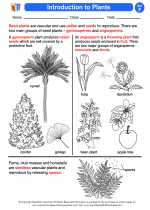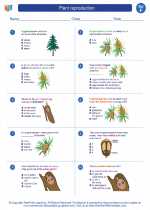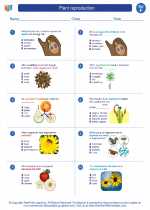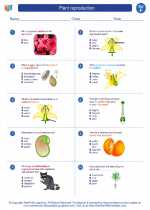Plant reproduction -> electromagnetism
Electromagnetism
Electromagnetism is a branch of physics that deals with the study of the electromagnetic force, which is a fundamental interaction between electrically charged particles. This force is responsible for the behavior of electric and magnetic fields, and it plays a crucial role in various phenomena, including the behavior of charged particles, electromagnetic radiation, and the operation of electric motors and generators.
Key Concepts
- Electric Field: An electric field is a region surrounding an electric charge where another electric charge experiences a force. It is represented by electric field lines that show the direction of the force experienced by a positive test charge placed in the field.
- Magnetic Field: A magnetic field is a region around a magnet or a moving electric charge where another magnet or moving electric charge experiences a force. Magnetic field lines indicate the direction of the force experienced by a north pole of a magnet placed in the field.
- Electromagnetic Induction: Electromagnetic induction is the process of generating an electromotive force (EMF) or voltage across a conductor in a changing magnetic field. This phenomenon is the basis for the operation of electric generators and transformers.
- Electromagnets: An electromagnet is a type of magnet in which the magnetic field is produced by the flow of electric current. By passing an electric current through a coil of wire, an electromagnet can be created, which can be controlled by the amount of current flowing through the coil.
- Maxwell's Equations: Maxwell's equations are a set of four fundamental equations that describe how electric and magnetic fields are generated by charges and currents, and how they in turn affect the behavior of charges and currents. These equations form the basis of classical electromagnetism.
Study Guide
To master the topic of electromagnetism, it is important to understand the following key points:
- Understand the relationship between electric charges and the electric field they create, including the concept of electric field lines and the behavior of positive and negative charges in an electric field.
- Learn about the properties of magnets and magnetic fields, including the behavior of magnetic field lines and the interaction of magnetic fields with moving charges.
- Explore electromagnetic induction and the factors that determine the magnitude of the induced EMF, such as the rate of change of the magnetic field and the number of turns in the coil.
- Study the principles of electromagnets, including the factors that influence the strength of the magnetic field produced by an electromagnet and its applications in devices such as electric motors and relays.
- Gain a basic understanding of Maxwell's equations and their significance in unifying the theories of electricity and magnetism.
Practice Questions
- What is the relationship between electric charges and the electric field?
- Explain the behavior of magnetic field lines around a bar magnet.
- How is electromagnetic induction utilized in the operation of electric generators?
- Describe the factors that affect the strength of an electromagnet.
- Why are Maxwell's equations important in the study of electromagnetism?
By understanding the concepts and principles of electromagnetism and practicing related questions, you can develop a solid grasp of this fascinating branch of physics.
.◂Science Worksheets and Study Guides Sixth Grade. Plant reproduction
Study Guide Plant reproduction
Plant reproduction  Activity Lesson
Activity Lesson Introduction to Plants
Introduction to Plants  Worksheet/Answer key
Worksheet/Answer key Plant reproduction
Plant reproduction  Worksheet/Answer key
Worksheet/Answer key Plant reproduction
Plant reproduction  Worksheet/Answer key
Worksheet/Answer key Plant reproduction
Plant reproduction  Vocabulary/Answer key
Vocabulary/Answer key Plant reproduction
Plant reproduction 

 Activity Lesson
Activity Lesson
 Worksheet/Answer key
Worksheet/Answer key
 Worksheet/Answer key
Worksheet/Answer key
 Worksheet/Answer key
Worksheet/Answer key
 Vocabulary/Answer key
Vocabulary/Answer key

The resources above cover the following skills:
LIFE SCIENCE
From Molecules to Organisms: Structures and Processes
Students who demonstrate understanding can:
Use argument based on empirical evidence and scientific reasoning to support an explanation for how characteristic animal behaviors and specialized plant structures affect the probability of successful reproduction of animals and plants respectively.